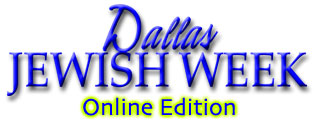| Dallas Jewish Week Menu
|
 |
Money in action
Dallas group joins mission to see how funding helps in Argentina
by Florencia Arbiser
Jewish Telegraphic Agency
"Do you speak English?" was the frequent question from the American guests.
"No, but I speak Hebrew," was the repeated answer from the Argentine hosts.
The exchange was heard repeatedly last week as a group of 54 representatives of the United Jewish Communities, 10 from Dallas, visited Buenos Aires to see firsthand how the local Jewish community uses funds provided by the umbrella group of North American federations.
The group met with social workers, rabbis, community leaders, volunteers and formerly prosperous families now are unemployed.
"This community is very knowledgeable about Israel and very educated," said Dallas' Jack Baum. He was surprised to see that many Argentine Jews who speak broken English speak Hebrew quite well.
Perhaps more important, he also was impressed by the way members of the community were reaching out to those in need.
"Argentina, with some 200,000 Jews, has such a large community. If they are in pain, we all are," Baum said.
To the mission chair, Robin Chotin of Denver, the meetings with members of once-middle-class families who lost their jobs or their businesses were particularly important.
"We learned this trip that this could happen to us," Chotin said. "And the Argentine community has been so philanthropic."
Baum's wife, Janet, said the trip was a very meaningful experience. She encouraged other members of the Jewish company to "stand up and be counted."
"What we can do as Jews is give these people dignity," she said. "These people are proud and they have to go through job retraining."
Perhaps the biggest change facing Argentine families arecareer changes for people in mid-life.
Local capital campaign chair and trip chair Jeff Chapman called the Baums "the true stars of the trip."
Represented during the mission were federations in Atlanta; Denver; East Bay, Calif.; MetroWest, N.J.; New York; Northeast New York; Palm Beach, Calif.; Rockland County, N.Y.; Savannah, Ga.; and Washington.
During a lunch at a kosher restaurant in the area of town known as Once - a neighborhood with many Jewish shops - delegation members spoke with Hillel students about the needs of sharing Jewish life with fellow students.
After lunch, Steve Selig of Atlanta, the national campaign chair, said that Jews of Buenos Aires represent a very committed, proud and historic community.
"We all feel very at home here," he said.
"We are definitely making a difference with our money," he added. "We are helping to feed, clothe and educate, and provide medicine, job training and resources to make aliyah."
Last year, the UJC allocated $5 million for welfare programs in Argentina and another $35 million for aliyah, said Victoria Agron, in charge of financial resource development for the UJC.
On the mission's last day - a very humid one - the group met education representatives from the Jewish Agency for Israel, the American Jewish Joint Distribution Committee and AMIA, the central institution for Argentine Jewry.
They unveiled their new education coalition, a year in development, which will work to help financially troubled Jewish schools in Argentina.
"I would go again," says Chapman. "There were É things we saw were troubling. It is one thing to read about a situation and another to see it for yourself. The economic chaos profoundly affects our Jewish community. Our donations are finding their way to Argentina and now I know they are being put to good use. It is a powerful thing to feel it with your heart."
Tamara Stokes of DJW contributed to this article.
This story was published in the DallasJewishWeek
on: Thursday, March 13, 2003
Copyright 2003, Dallas Jewish Week